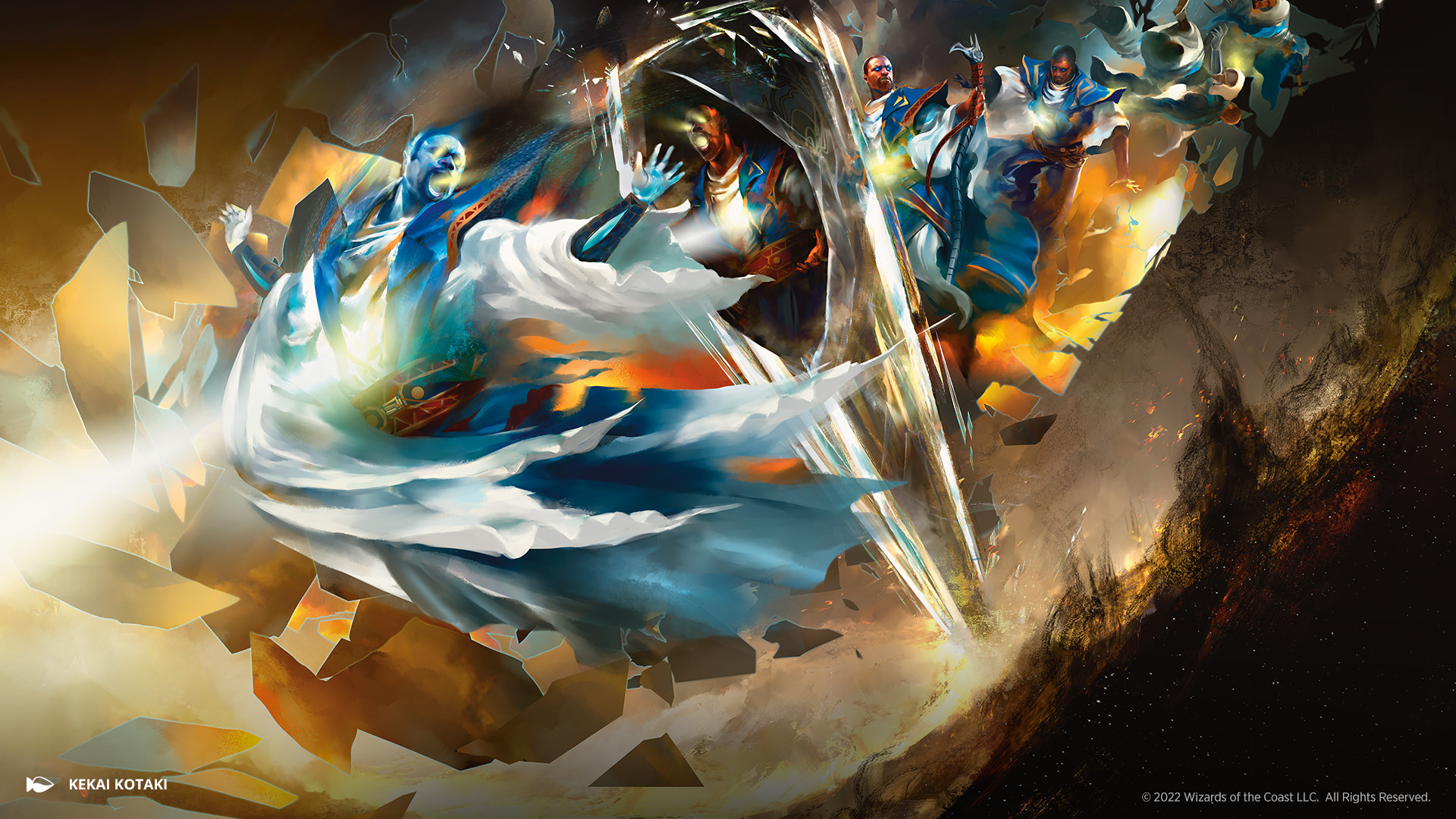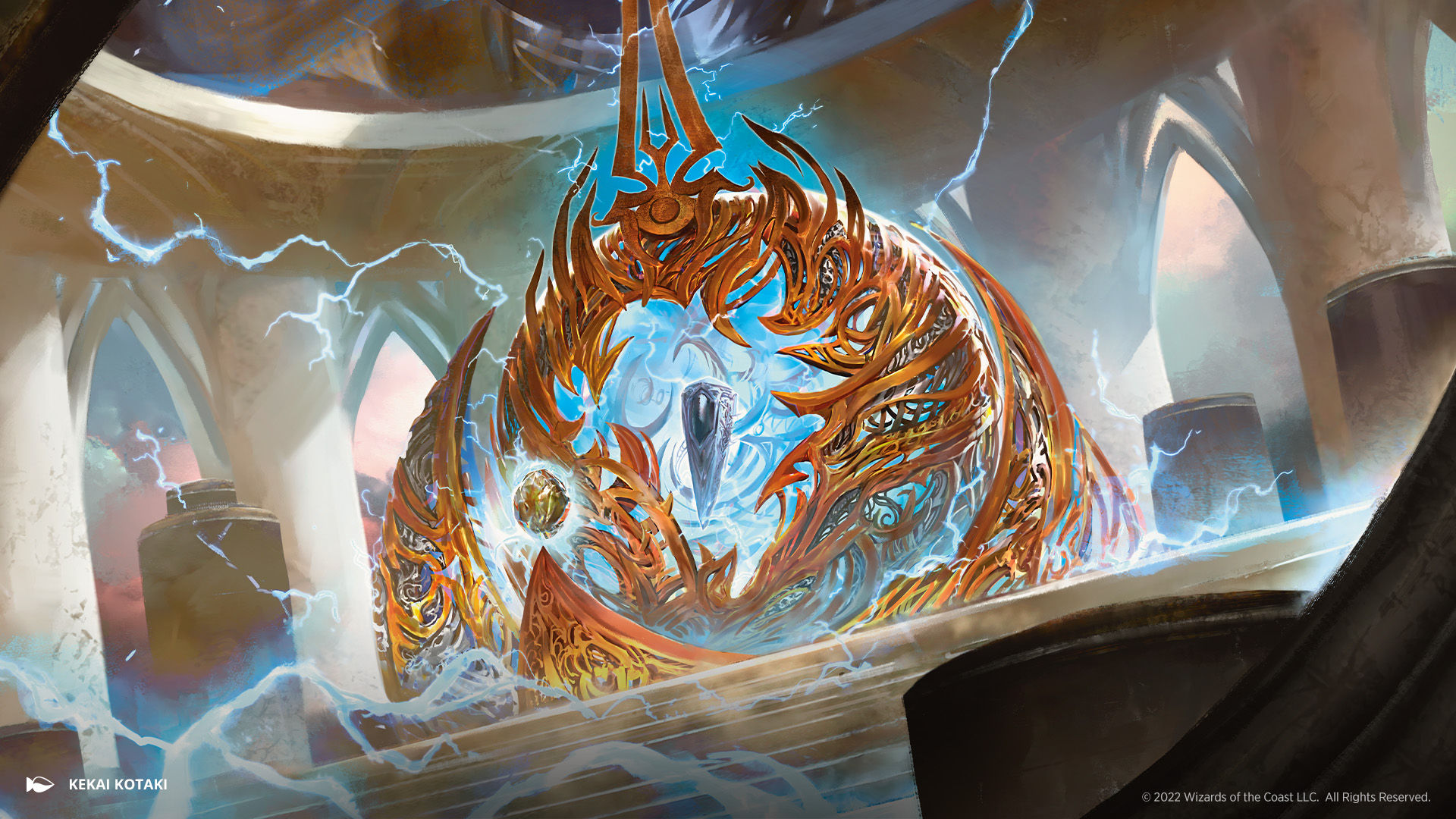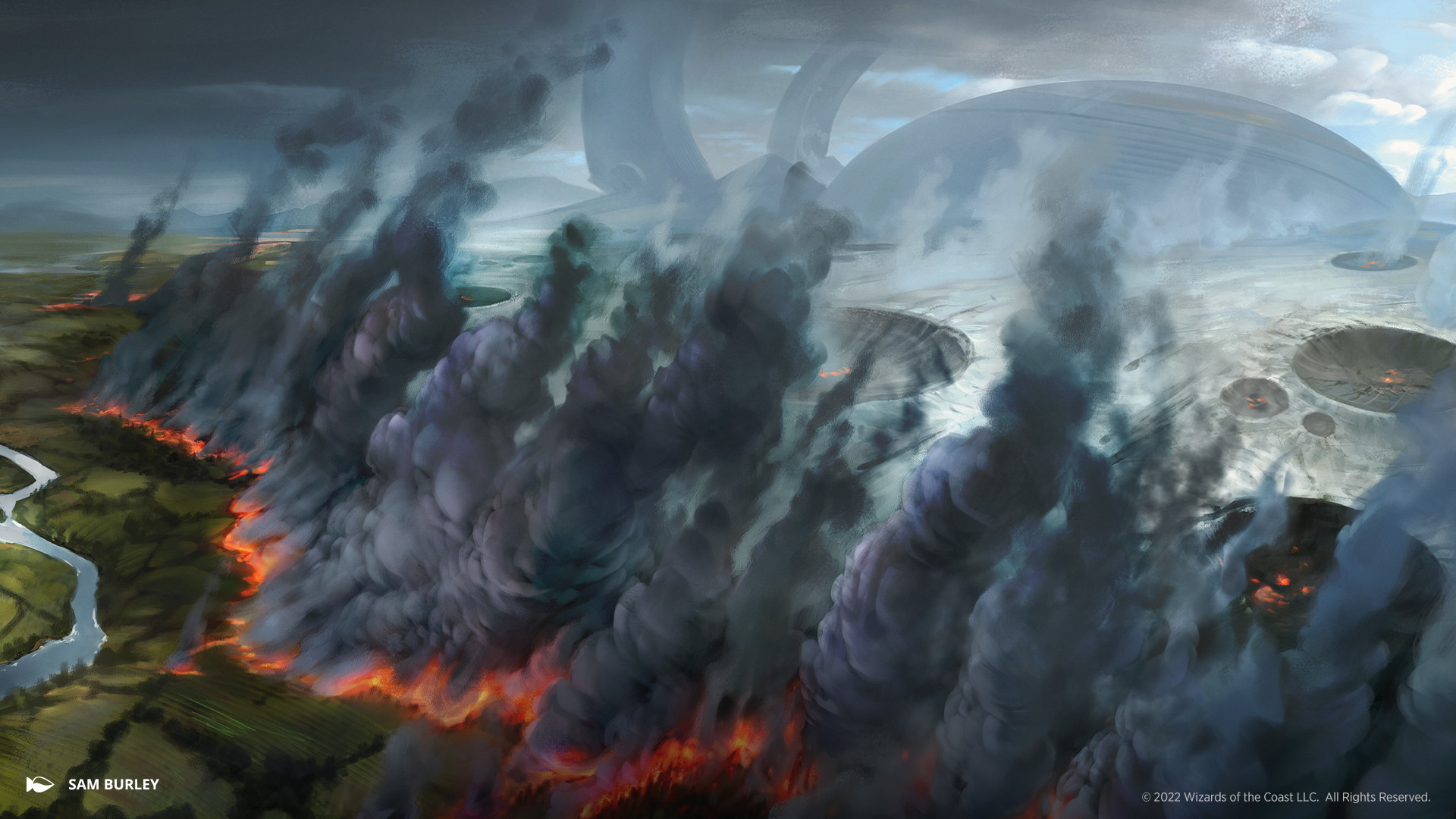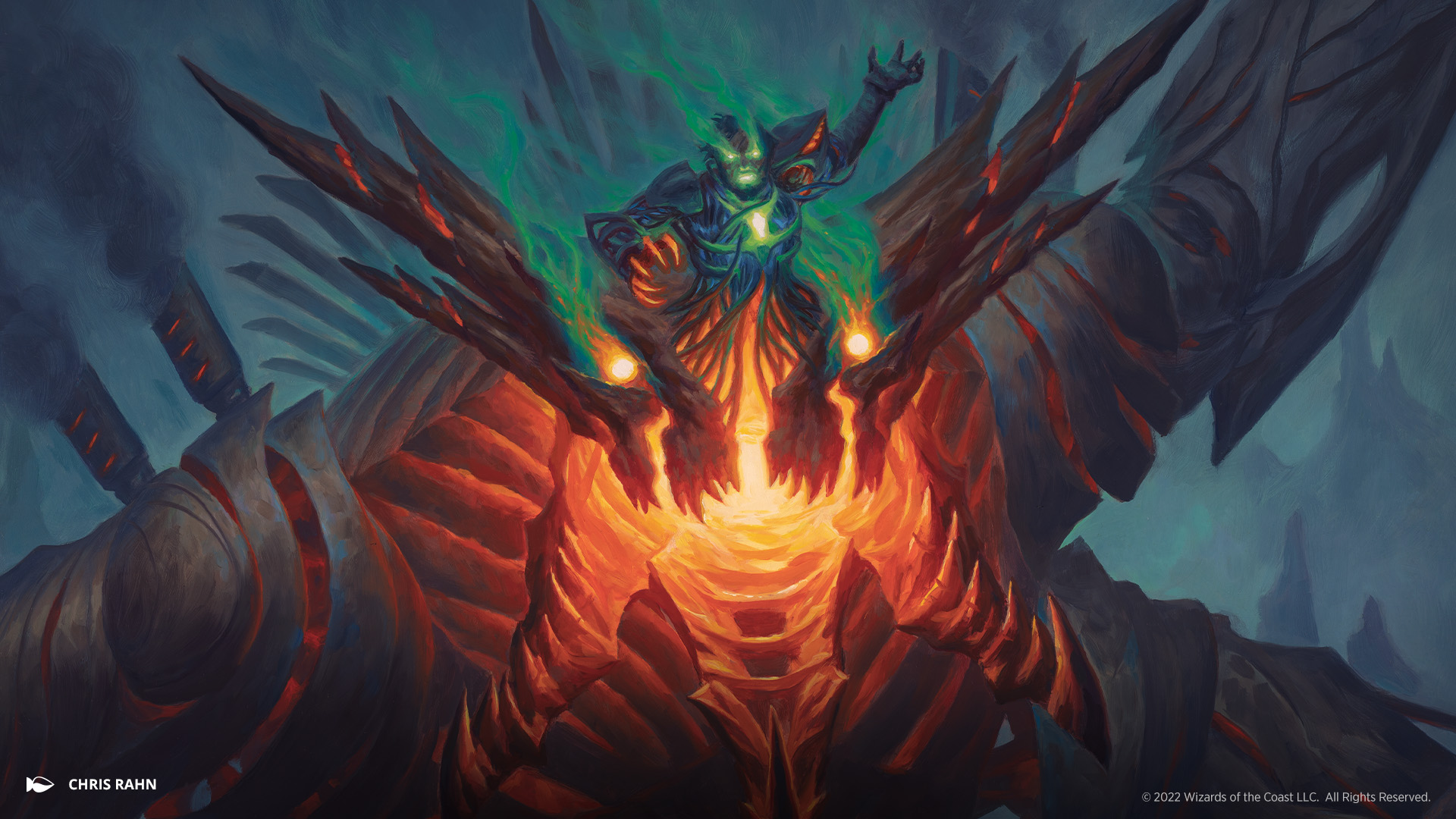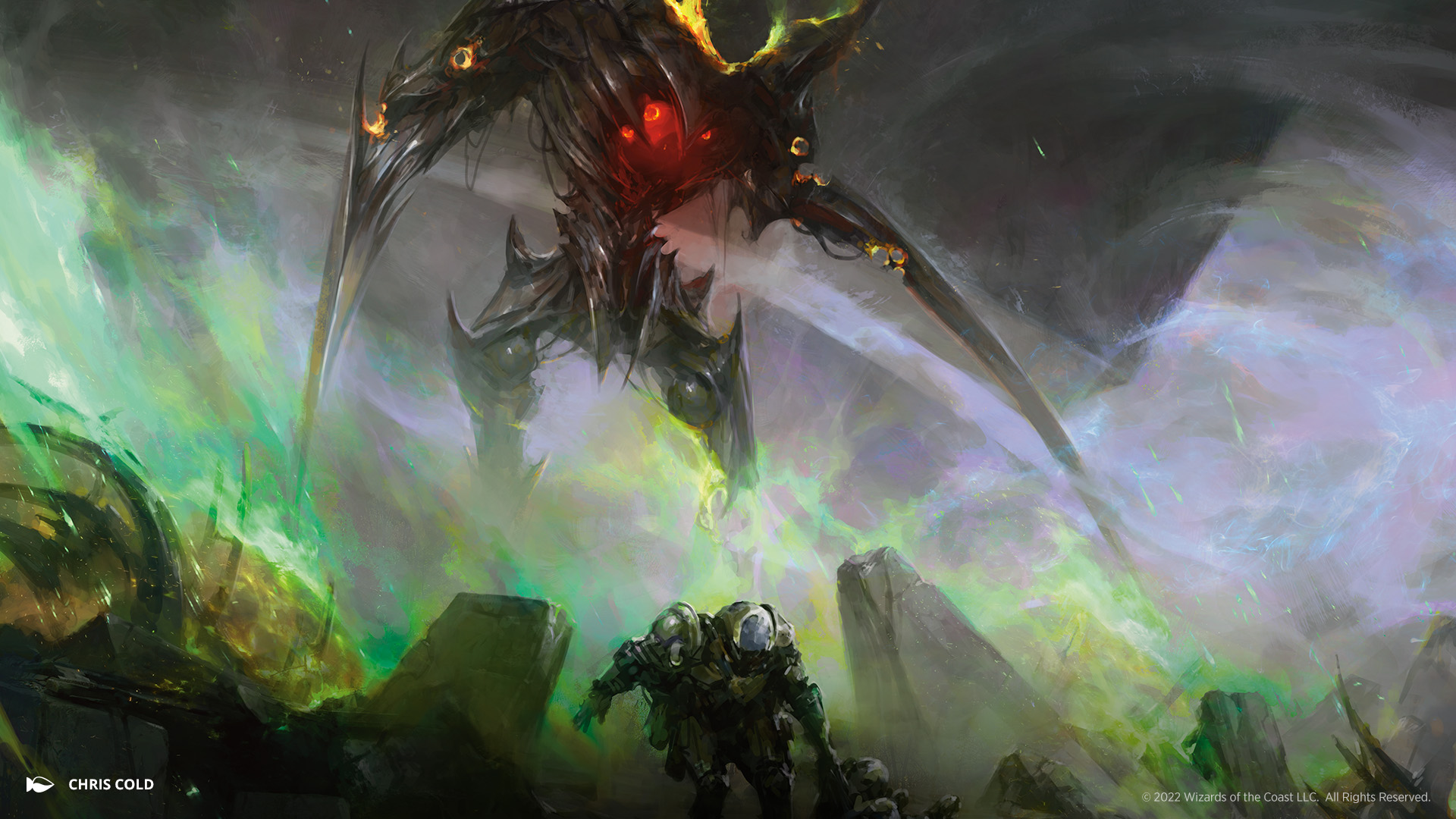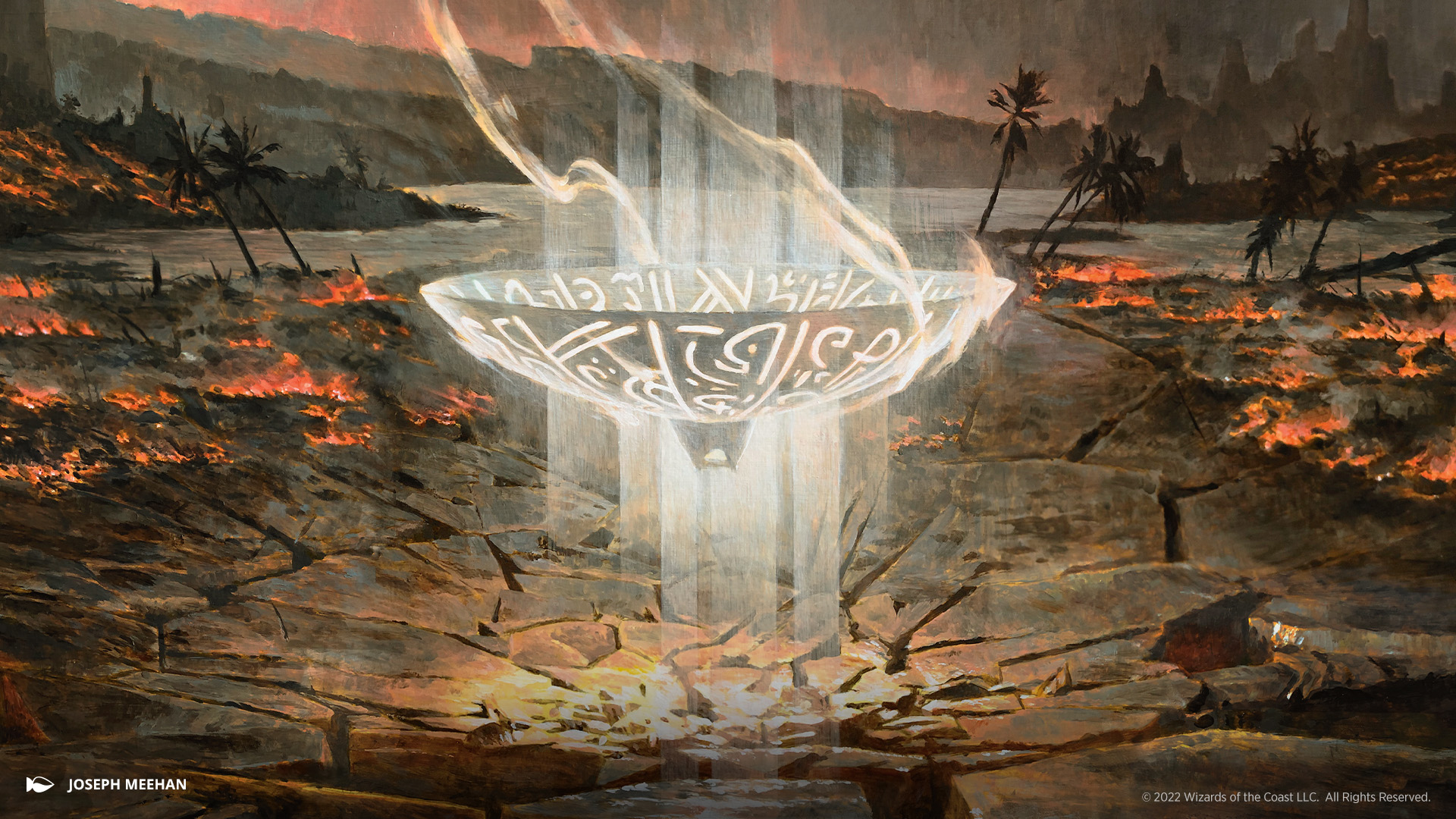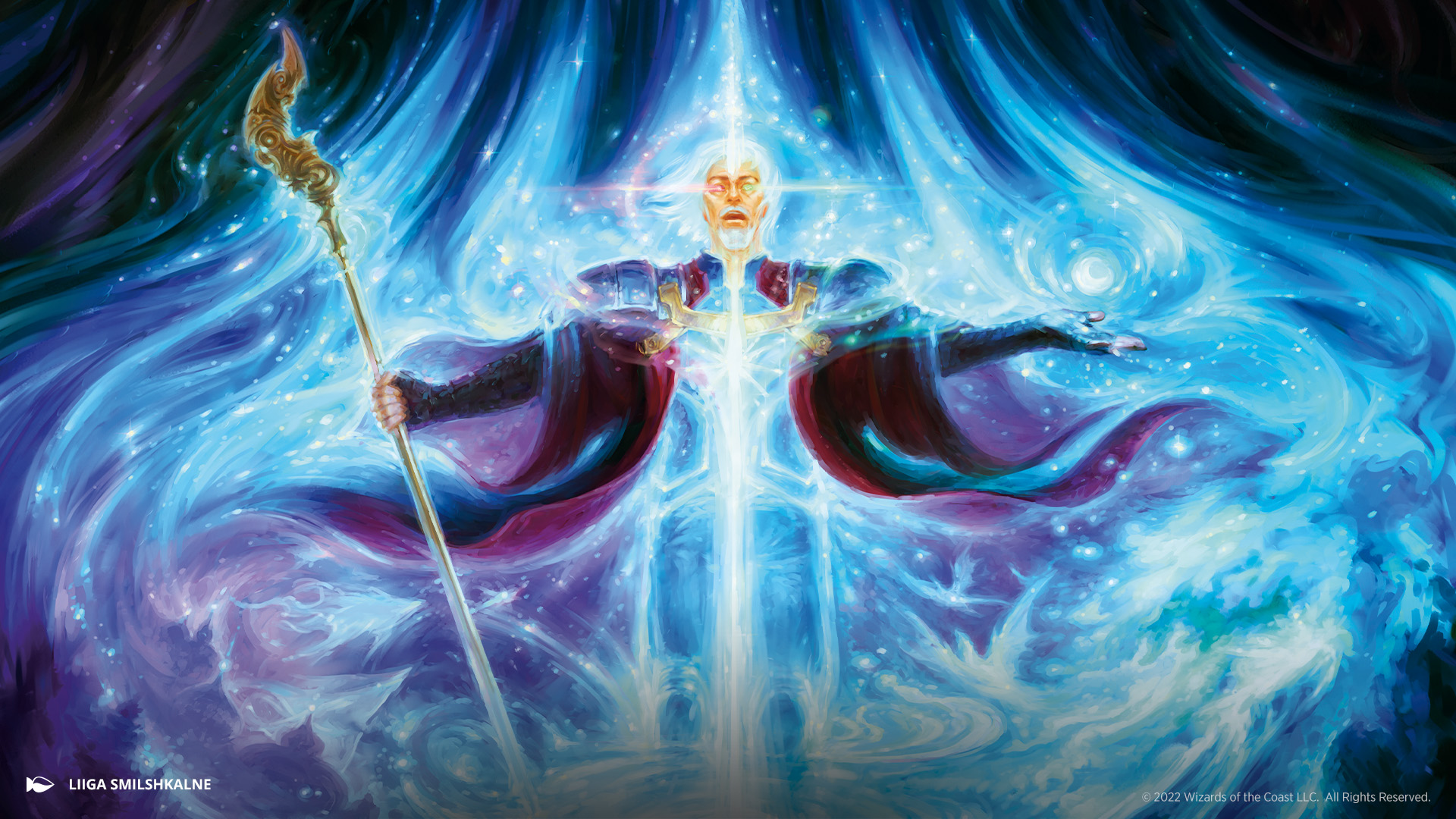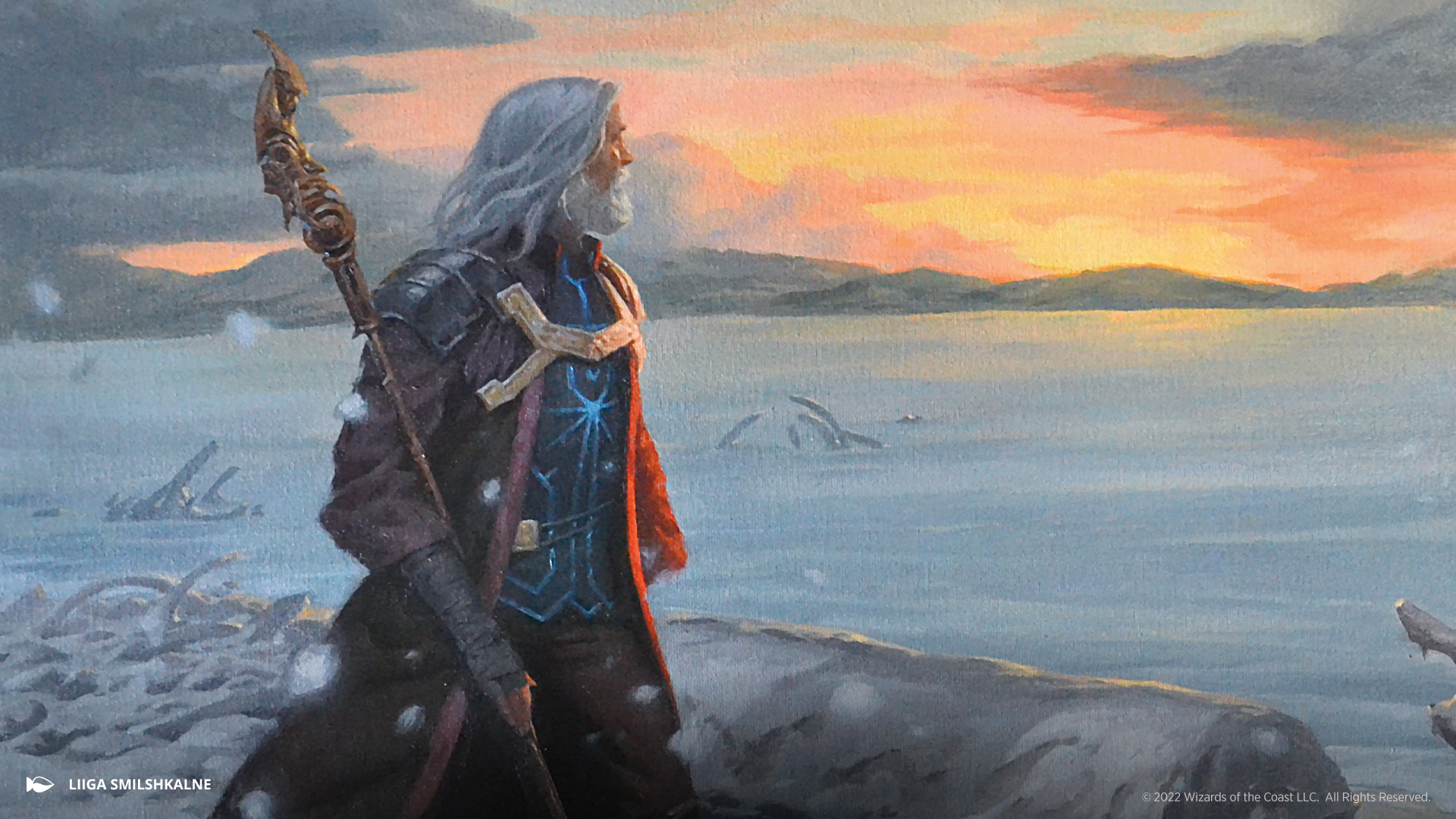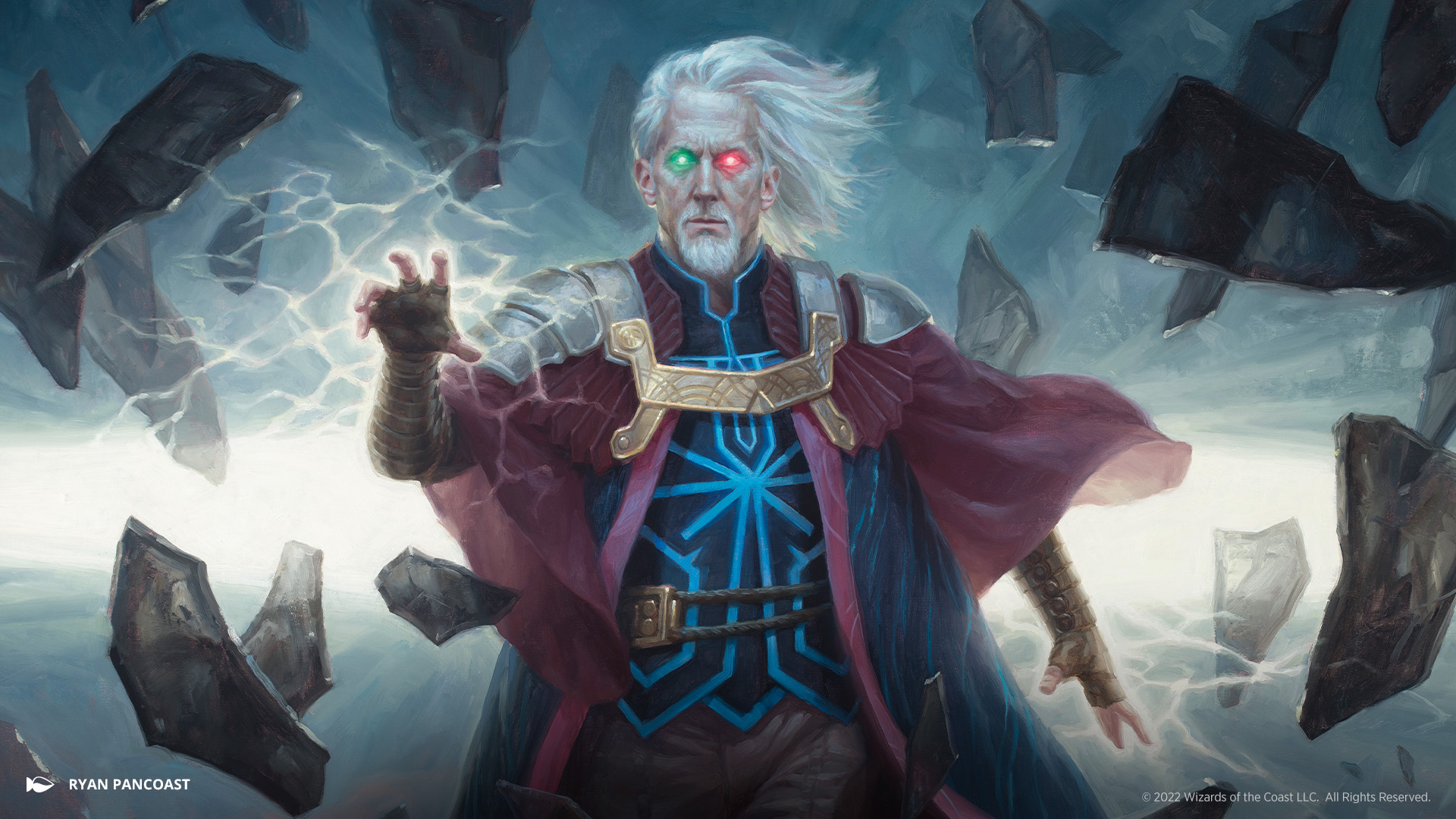The Brothers' War | Episode 5: As Cruel, As Necessary
4562 AR
Teferi lay shirtless in a cold metal coffin, counting his breath. How much time did he have before transmission? A minute at most, though it felt like an eternity.
A quick double knock on the lid of the coffin. Kaya, asking if he was ready.
It had been a month and some days of testing, of venturing back an hour, a day, a week at a time, ensuring that nothing changed, that the secret phrases Kaya and Saheeli wrote down and planted days prior were accurately reported back to the present; a month of this and Kaya still asked if he was ready. If he was okay. Teferi smiled inside the coffin, a soft and sad smile. These new walkers were different from the ones he had come up with. More human—even if they weren't human.
Teferi knocked twice on the inside of the lid. He was ready.
A faint purple glow spread before him, brightening his vision with ultraviolet and deeper shades. A lightness tingled his fingertips, his toes.
A comforting thought, should he not return: Kaya would lead them all. She and Elspeth, and Jace besides. Good hands. Teferi exhaled and tried to get comfortable. He thought of Wrenn and her songs.
The metal never seemed to warm, no matter how long he lay on it. How long did The Antiquities War say Tawnos was in his coffin? Five years?
"You can ask him," Kaya said. Her voice was faint, sibilant in his mind. He couldn't hear her—she spoke through him, for him. In this middle stage between corporeal and insubstantial, there was less and less of a distinction between the two of them.
Teferi laughed, Kaya laughed. They couldn't stop themselves—the nerves, the fatigue. Kaya was his medium; she was already in his head. More accurately, he was in hers.
"Remember," Kaya whispered. "Concentrate on the sky. Find the deepest dark."
Teferi did. The Temporal Anchor's humming climbed another step.
"Time is a tapestry, and you are a needle."
Piercing. Howling.
The coffin started to grow hot. Teferi's breath came faster. He couldn't hear anything but the layered tones of the anchor rising. He heard Kaya and Saheeli shouting across the cacophony to each other, Kaya's voice echoing in his own mind.
He never got used to this part. He hated this moment, this tearing of his spark and soul from his body—
"Go."
He felt his body slip away,
and with it the cold metal
of the facsimile coffin.
The mission was not the problem. They had their target identified, and they knew where to look for answers. They had power, they had weapons, they had knowledge, and they had allies. Crucially, they had a new sylex.
The problem was they didn't know how to use the damn thing.
Saheeli had built an essentially perfect replica from Karn's plans and notes, but for all her brilliance she remained only an engineer. The mystery of the sylex's activation was not mechanical—it was magical, a spell buried in history, and history was unreliable.
To wit:
The Golgothian sylex had first been created or discovered by Feldon, a scholar of languages and ancient glaciers, some decades before the Brothers' War. As well, it had been created by Ashnod, carved from the skullcap of the qadir her master, Mishra, replaced. Also, it had been pulled from Old Phyrexia's deepest ichor well by Gix, a demon who slouched to Dominaria out from dreams of steel and oil. Also, the sylex had been chiseled from a giant's tooth and kept by the kobolds of the Khers; as well it was one of Tal's hardened tears, the spell-frozen corona of a falling star, the melted heart of a mountain hammered into shape by Sardian dwarves, and so on, and so on.
The myths of that old world-ender's beginning filled reams, and there was no way to tell which one was true. Likewise, for the sylex's end.
Karn believed his to be the real one, but histories Teferi had dug up spoke of the sylex being destroyed by Urza, or shattered by Jared Carthalion, or consumed by a great and long dead dragon, or tossed into a lake as tribute to some icebound god.
By Teferi's reckoning there were four or five sylexes worth following up on, and contradictory histories for all of them: thus, the anchor, the needle, and the tapestry.
"So how do we find it?" Saheeli asked. She had a direct, solutions-focused mode that Teferi appreciated in a crisis.
Teferi looked out over the papers, scrolls, manuscripts, etchings, and ancient tomes spread before him. They covered the old drafting table, a layer of history encompassing thousands of years of Dominarian legend. All of them were useless, he thought, save for one.
Teferi reached out and shoved the histories aside, knocking some to the floor as he searched. He had read and discarded it early on—not for a lack of craft, but for a lack of specifics.
Saheeli said nothing. She arched an eyebrow and watched the time mage throw valuable texts into musty corners until he stood, triumphant, holding a mold-scarred manuscript.
"The Antiquities War," Teferi said. He slapped the papers on the table and opened them. "Here," he said, stabbing a finger on the moldering epic. "Urza's wife, Kayla bin-Kroog, wrote this epic chronicling the history of the war she herself bore witness to. There are many versions and translations, but they all end the same way: Urza activated the sylex on Argoth and ended the war." Teferi looked up at Saheeli. "We go here—the last battle of the Brothers' War."
"Good enough." Saheeli nodded. "I'll get to work."
He felt her there with him
He was her needle through time,
a spirit who echoed, echoed,
Echoed.
Urza, this coffin, the sylex, the Phyrexians—threads enough for Teferi to be sure that there was some greater cosmic architecture, some logic animating this moment that even he could not hope to understand. Fate's unknowable tempo moving not just Teferi, but all of them in a grand orchestration through history. All Teferi could do was look backwards through his furrowed path and hope that something in his wake would hint at what was to come.
Teferi kept this worry private. It would not be reassuring to his friends and allies to see the consummate chronomage so reduced. To know he was a captain standing blindfolded at the rudder, only a sailor who had not once been to sea.
At night he stood alone in his room near the top of old Urza's tower, staring at the worn floor, unable to sleep.
Teferi was just as lost as the rest of them.
The darkness was absolute,
He floated, a
Alone?
Teferi's head ached. With all this temporal sojourning, he hadn't slept well in weeks. Or maybe he did—maybe he had been asleep this whole time. He didn't remember.
In the coffin Teferi wore a blindfold over his eyes and a simple set of underclothes. A bandage wrapped around his midsection. Though it had been some time and Elspeth had laid on hands and treated his wound with Halo, the Phyrexian creature had wounded him deep. He felt its ache when he breathed, though this, too, he kept to himself. Whether phyresis gnawed away at his marrow or the Phyrexians threatened the barricaded doors of this chamber, the approach of death was steady and unstoppable. Unless—
Echoes. Time. History repeating itself, with variations. Teferi did not know whether the creature that carved him open had left glistening oil in him. He did not know if Elspeth, Wrenn, Jodah, and the others would fail to hold them back now. All he could do was play his part.
Teferi managed his breathing. He didn't know when now was.
Had he died? Or was there someone else in the darkness with him?
Count the beats
One, two, three, four,
What was taking him so long—
All Teferi had learned from time travel was the easy and true joke: it was only possible to go forward, once, and only at the pace of life.
Urza cracked this axiom. Teferi had been there and knew that it cost nearly everything. Since his own brush with time, he had stayed away from violating that law. Manipulating time was casting sparks in a drought-dried ocean of grass: conflagration was all but assured. The only thing left to chance was the might of the fire that would follow.
But when the field was already burning? When the fire had already swallowed up everything?
for both
the needle and its thread, flashing—
Once set in motion, you can't stop it
Silver.
Silver could evade time's ironclad law. Urza discovered that silver could travel physically back in time, made Karn and, Teferi supposed, started this whole affair.
Physical travel was not what Teferi and the others needed or desired. Physical travel would be the same as standing in the conflagration and dousing oneself with lamp oil. No, they didn't need to go back themselves—they only needed to see what occurred.
Saheeli had cracked the problem. Forgo the silver; if you're heading into a conflagration, go as a spark. By extracting one's spirit and casting that back, one would be unable to interact with the past while remaining able to observe—the flipside must also be true, or at least not false.
On paper, this made sense.
So had Urza's plan, Teferi reminded himself—and how did that end? Tolaria in flames, rifts torn in time, that endless lingering. Had there not been a threat so great to warrant this endeavor, Teferi would never have agreed to undertake this expedition.
Had there not been a threat so great, Urza never—
Yes, yes, Teferi thought. Of course.
And in the end? What
would they both say of their timelessness?
It was like falling, like dancing.
85 AR
Teferi arrived in a dark room in a flooded city that he would later learn to be Kroog.
There, he watched a brutal man go mad and scream about ghosts and assassins. This was worrying: no one should be able to see him. None of the tests they ran indicated that anyone could see him as a spirit.
Teferi departed; anyway, this was not the moment he was looking for.
28 AR
Teferi stood in a dark alley under a burning sky. He was back in Kroog. He recognized it immediately from the towers: during his first visit they were crumbled ruins. Now, they stood proud above a city under siege. The bells thundered above rising screams.
The dead were everywhere.
This was not the Last Battle, but Teferi lingered for a moment. A soldier, a boy in what Teferi would later learn to be a Fallaji uniform, reached out to him. He said something over and over, a plaintive word that, while Teferi told himself he did not understand, he knew he understood.
"Father," the boy gasped. The boy died.
Teferi stood, jaw clenched. His body back in the coffin twitched, as one does when they are dreaming.
"Not yet," he whispered.
Kaya, who saw everything Teferi saw, never spoke about this moment to anyone.
44 AR
Teferi walked through a charnel valley somewhere southeast of Tomakul. This was the same war as the one he saw days prior, now decades later. Metastasized to its mechanized apex.
Long, deep trenches striated the land. If Teferi could fly above it, he would look down on a world rippling with muddy scars. Machine and human corpses were thick as crops in a farmer's field, draped over trench and wire, twisted and broken. Between them marched columns of soldiers laden with packs under rain-slicked coats. These were armies of men more dead than alive, as spectral in soul as Teferi was in body.
Once the armies passed, ghouls stalked the fields of the dead, harvesting the bodies they found useful. Teferi watched as black-clad and shuddering figures loaded crude, wheeled carts with human and machine corpses, hauling them away toward Tomakul, until one of them saw him.
Teferi departed, steeling himself. If this unremembered field had seemed to him a circle of hell, then what terrors did the Last Battle hold?
4562 AR
Teferi, Kaya, and Saheeli sat around the open coffin, Teferi eating while Kaya and Saheeli drank coffee. It was some horrible time between night and morning. None of them slept anymore.
Outside it was quiet. Kaya told Teferi that Elspeth had been in an hour or two before he emerged. She had asked about his progress and told them that the Phyrexians were close.
"What does 'close' mean?" Saheeli had asked her.
"Bar the door when I leave," Elspeth had responded. She had been on the line with the other Planeswalkers, and her voice was hoarse from shouting over the sounds of combat.
Time was running out. Success or failure, they were stuck inside until the end.
"I found it," Teferi said, breaking the silence.
"When?" Kaya asked.
"When I was coming back," Teferi said. "I saw it, like a scar. Part of the tapestry blotted out, like ink spilled on a page. Blotted time. I haven't been to that one yet."
Kaya nodded. She didn't need an explanation.
"The anchor might not be able to take another sojourn," Saheeli said. Her voice was softest of the three of them, but it carried best in this cold and vaulted room.
"What happens if the anchor fails while he's inside?" Kaya asked.
"I don't know," Saheeli admitted. "I would guess that he dies. His body dies, at least. His spark," she waved her hand, fingers dancing toward the ceiling. "Nothing good."
"And her?" Teferi said, nodding toward Kaya. "She is my medium—she's back there with me. What would happen to her?"
"Teferi, I only built the anchor," Saheeli said. "I'm an engineer. I know how it could fail. The anchor's powerstone could erupt, or the temporal bridge would collapse. The coffin would overheat and implode." Saheeli sipped her coffee. "I know how machines break," she said, "not what happens to a soul when it is severed from its body."
They let Saheeli's words be the last on the topic. They finished their coffee and small foods. Wordlessly, Teferi slid back into the coffin and draped the cloth back over his eyes.
"Ready?" Kaya asked Saheeli.
"Ready," Saheeli agreed.
"Teferi?"
"Let's go," Teferi said. "I'll see you all in a little while."
Kaya closed the coffin lid. In the darkness, Teferi slipped away.
63 AR
Urza sat cross-legged with the bowl in his lap. The runes within the bowl spiraled toward the center. Blood from the gushing wound on his forehead dribbled into the bowl and filled the carved runes with crimson.
In the present day, Kaya whispered her dialogue with Teferi, relaying everything that he saw. Her voice had a deeper resonance, a layering that placed Teferi's voice under her own. Saheeli, though she was occupied with running the anchor, could not help but listen.
"The blood from the cut on Urza's forehead is dropping into the bowl, filling the runes. He's sitting cross-legged with the bowl in his lap," Kaya muttered. She swayed, sweating, hands placed on the coffin.
The Mishra machine had recovered from the avalanche and was now charging up the hill, its dragon head screaming. Urza looked up and saw his brother's face, half-torn from the metallic skull beneath, and wept for him.
"His brother is close to him. It could be triggered by a kind of sympathetic resonance between the two. Maybe it takes more than one person focused, some heightened emotional state—or could it be the proximity of Phyrexian technology," Kaya said.
"What else?" Kaya asked.
"Tears. Lots of tears. Urza never cried. He's so
The Mishra machine had attained the hilltop now, and its serpent head loomed high above them. Mishra was grinning, the smile half-flesh and half-steel. It was the grin of a man triumphant.
Mishra was screaming something.
A flash at the base of the bowl—
A flash at the base of the bowl—
A flash at the base—
A flash—
"STOP!"
4562 AR
Teferi slipped back to the present.
He barely made it out of the coffin before he retched, coughing out a thin mix of water and salt crackers onto the cold stone floor of the chamber. He trembled, the wound at his side aching. Behind the blindfold he wore against the brightness of the real world, a kaleidoscope of color pinwheeled.
"I almost have it," he lied as Kaya helped him out of the coffin. "I think it has to do with the blood, or maybe the depth of the grooves. Saheeli," Teferi shouted. "Does your sylex spiral? The runes?"
"Of course it does," Saheeli shouted back from the base of the anchor, where she was busy making small adjustments and repairs.
Kaya pressed a cold towel to Teferi's forehead. "Listen," she said, steadying him as he swayed. "What we're seeing back there—what your spirit is exposed to—it's brutal."
"Do we have time to rest?" Teferi asked.
"Eat," Kaya said, ignoring the question.
Teferi ate a small amount, as much as his stomach could handle. He took a sip of water, then climbed back inside the coffin. The sound of fighting outside the chamber went unremarked.
"Hurry," Kaya said. "Please. This is difficult for me as well." Her usual demeanor, her devil-may-care attitude was gone.
Kaya was right and Teferi knew it. As his medium, she may as well have been right there with him every time he cast back.
"Give me as much time as you can," Teferi said.
Kaya looked at the barricade they had piled against the chamber door, then back to Teferi. "Last one," she said. She closed the coffin lid and slammed its latches locked.
In the quiet of the stasis coffin, Teferi felt he could be anywhere. It was warm now, comfortable, and stank of his sweat. He exhaled and waited for Kaya to do her work.
Two soft taps on the lid of the coffin—her hands. A purple whorl, spreading like silent fire across the inner lid, bright through his blindfold.
His body dropped away. He was anywhere.
A division between real-time—that is, what Teferi thought of as the present day, which he could not see beyond—and back then. With the aid of Saheeli's Temporal Anchor and Kaya's extraction and mediumship, it was an easy enough task for Teferi to step between real-time and back then; the difficulty was fatigue and navigation. He could go back to any point he could remember but had to discover the moment first. The travel left him exhausted and weak.
Teferi, as best he could, set his fears aside. He tried to let the task at hand replace them. A month of meticulous searching, and he had finally found the moment he needed when it was most desperate. The Phyrexians were, quite literally, at the door.
Alone Teferi stood under a firmament his mind told him was a night sky and searched it for the dark nebula he knew to be the Brothers' War. He found it and stepped inside, his spirit crossing millennia with a thought. Inside that space was a manifold darkness, a nothingness patterned with textures Teferi had only just begun to comprehend.
He found the curious one, the stygian blot he hoped was the Last Battle, and—as a needle plunging through cloth—dove inside.
A black sky. A rain-lashed beach. Ticking and twitching metal ruins, still dragging themselves toward their enemies. Two titanic constructs collapsed across each other over the wild-burning old growth. Behind him, oil-slick waves crashed and roared, dragging dead bodies up and down the stained sand.
Argoth. The Last Battle. Moments before the end of the world, again.
63 AR
The Mishra machine had attained the hilltop now, and its serpent head loomed high above them. Mishra was grinning, the smile half-flesh and half-steel. It was the grin of a man triumphant.
Mishra was screaming something.
A flash at the base of the bowl—
Everything stopped.
That was not entirely accurate. Everything slowed. With a gesture, Teferi divided time's progression by halves down to an infinite number. Time, as much as Teferi could observe, froze.
Command over time was an awesome power. Godly. Teferi knew it to be ruinous, so he was a careful practitioner. He had thought the answer lay in observation, in taking special care with this moment to note every detail of Urza's movements, emotions, and words. There was so much he did not know, so he tried to observe and report on every single thing—even the rain, just in case that was a component of the spell.
All his care rewarded him with nothing. None of what he saw even so much as warmed the bowl of Saheeli's facsimile sylex. He had to find some way to step beyond.
Teferi thought of a way. It was a risk. Was this not a risk? Everything could go wrong, yes, but back in his time everything was already going wrong: Karn was gone, the Phyrexians were on Dominaria again, Jaya was dead, their last redoubt was about to fall. What was the worst that could happen? Teferi thought. The end of the Multiverse?
Circumstances pushed him to be reckless. That infinite halving that protected him also distanced him; he needed to align his time with Urza's.
It was a terrible risk. Teferi weighed what he knew: Urza did not die when the sylex detonated. No one knew how he came back or when, but Teferi knew him when he was young. He had studied under him at the Tolarian Academy. However, just because Urza lived it did not mean Teferi—even as a spirit—could withstand the sylex's blast. That artifact was more than just a bomb: the Shard of Twelve Worlds, the Ice Age, every important event over the last four millennia—everything came after this moment. His family came after this moment. If Teferi could have taken a deep breath, he would have. A thought, as he acted: existence is not guaranteed.
Teferi stopped holding back time.
The Multiverse tore open.
Everything came after.
??????
What remained of Urza sat cross-legged on a scrape of Argothian earth. The sylex was balanced on his lap, its bowl filled with white, scouring light frozen in bloom.
Teferi stood a short distance away, a spirit in soft hues. He could see little of Urza behind the light emitting from the sylex, but enough to make out the Planeswalker's silhouette inside the detonation.
Together, the two of them were alone in an empyrean void. The ground underneath them was a small patch of Argoth, and then blank nothingness in all directions. To Teferi, it looked as if they were standing within the belly of a cloud.
Urza. How long had it been since Teferi had last seen him? How many lifetimes, how many lives? Teferi walked over to Urza and sat opposite the sylex. He cleared his throat.
"I need to tell you some things about the future," Teferi said to Urza. "Your future, my present. It concerns everything."
Urza looked up, his face a raw, grinning skull. "What?" he said, his voice unburnt.
"They won't be good things," Teferi emphasized.
"Curious," Urza said. He looked at the sylex, at the light creeping out from an illuminated point in the bowl's nadir, then out at the space that surrounded them. "One does not expect happy news in a formless void," he muttered. "Is this the afterlife?"
"No," Teferi said. "I hope not."
"Fine, then," Urza said. "Who are you?"
"In a moment—I need to ask for your help."
"You said you are from my future," Urza said, ignoring Teferi's insistence. "That you need my help. How do you know whether you talking to me will change anything?" Urza waved at the vastness of eternity. "Or worse—maybe it will change everything."
Teferi hesitated. "I'm not sure," he said. "We had to take this chance."
"We," Urza said. A question, posed as a comment. "Either what you're going to tell me matters a great deal, or it doesn't matter at all."
"That seems so," Teferi muttered. The two men fell silent. They looked once more at the sylex, that ruinous thing.
"You should know first that you are a great man now," Teferi said. "But you're nothing like what you will become." He tapped the edge of the sylex. The solid core of the light, tense as brimming water at the bowl's lip now, wobbled. That light was doom, Teferi thought. He was staring at the end of one age and the dawn of another.
"And what is that?" Urza asked. He cradled the bowl in his lap. Most of him was burned away by the sylex's detonation, but he did not appear to be in pain. Blackened flesh peeled back to expose scoured bone, and where there was nothing there was a brighter light—a spark, coalescing.
His spark. In this moment, Urza was becoming what he would become.
"Some would probably call you a god." Teferi thought back to his school days. "Others would call you a curse. I called you my teacher; most know you as 'Planeswalker.'"
Urza could not smile anymore—his skull had blackened and crumbled, his shoulders and ribs burned to ash. And yet his voice was strong as when he was whole.
"There's nothing I can do to change that, is there?" Urza asked. He sounded exhausted, not plaintive. Fatigued as a man gone decades without sleep.
"If I'm here now," Teferi whispered, "I don't think there's anything you or I can do to change what will happen. Time does not pass like the hand of a clock: it's already happening."
"Then what is this," Urza said, gesturing at the formless void that surrounded them. He stood, staggering up to his feet, the whole of his torso tumbling in gray clumps of ash.
"Allow me to lecture for a moment?" Teferi asked.
"Take all the time you need," Urza said, a sarcastic snarl creeping into his voice.
Teferi, still seated, leaned back, resting as one does in a soft field of grass, as if soaking in the sun. "There are many metaphors for time," Teferi began. "All of them are true, to some degree. Together they form a mosaic of understanding." Teferi watched as Urza stepped to the edge of the ground. If he had features left, Teferi guessed he would be staring out into the void.
"There's something out there," Urza whispered. "Hurry."
"People say time flows like a river," Teferi said. "But that only imagines time moving forward."
Despite his evident frustration, Urza was curious. He listened as Teferi spoke.
"That is neither totally wrong nor totally right. It's just limited by our perspective. Humans, I mean. We have one angle into the prism of existence: we only ever see time going one way, so to imagine time as a river isn't wrong. And since we're all a part of this," Teferi waved a hand at the void around them, "our metaphor contains some of the truth. Rivers are agents of time's passage. They exist on a scale larger than us. They also hold mysteries: If we were to walk alongside any river—the Mardun, maybe—we'd come across places where it tumbles into whorls and eddies, shoots off on little branches that go nowhere, or join other rivers, or are snipped off into their own lakes. Those lakes are places where the river stops; if time is a river, then those lakes are moments where time stops." Teferi said "I think we're in one of those right now."
After a moment's pause, Urza finally spoke. "Why?"
Teferi smiled and shook his head. "No idea. I took a risk based off what I knew to be true—I'm just as surprised to be here as you are."
"You say in the future I become a teacher?"
"Many thousands of years from now," Teferi said.
Urza scoffed. "My pedagogy needs work," he said. Gruff, but not unkind. Teferi knew the Urza of his own youth in Tolaria well enough to know the old goat approved of his decision. "So, what's next?" Urza said. "What do I need to know so I can tell you what you need to know?"
"You're going to encounter more of them," Teferi said. He did not need to explain; Urza understood who "them" meant. His brother, and the demon from Koilos.
"You're going to spend your life trying to fight the Phyrexians. First for what they did to your brother, and then for what they will do to you."
"Is that what that thing is called?" Urza muttered. "A whole race of them
Urza was being remade. Stitched together into something else.
Planeswalker.
"You lose," Teferi said. "The Phyrexians win. You fight them for millennia, but they always win. You discover there are more worlds than one, more than even you can count. Each occupies a plane of existence, and together they are bound up in a space called the Multiverse. You travel these planes for centuries and discover there are others who can travel them as well. Eventually, you establish a school—that's where we first meet, at this school—and you try to crack open the mysteries of time. You succeed but find you cannot go back."
"Then how did you manage it?"
"With great difficulty," Teferi said with a weary smile.
Skin filled in over Urza's light-woven scaffolding, raw and young, bleeding across to fill his features like a peach crushed on a white sheet. His lips re-formed in time for him to frown.
"Get to the point," Urza said. "Despite everything, I do not stop the Phyrexians. You are here having travelled through time in a way I could not. Why?"
Teferi could hear the pain in his old instructor's voice. Here he was, trapped at the moment of his death with a desperate man from the future who told him that his war did not end here. That his final act did not grant him any peace, but only unlocked a door holding back an even greater war, one whose trail of ruin was unavoidable, one that would stretch across thousands of years and claim countless lives. Had he been a kinder man, Teferi would have stopped talking. He would not have told Urza the truth.
Am I as cruel as he? Teferi wondered. As necessary? Time will tell.
"The Phyrexians are back," Teferi said. "In my time they threaten the whole of the Multiverse. As we speak, my body lies in your tower, surrounded by other Planeswalkers like us. The Phyrexians are attacking; they're trying to stop us from learning how to stop them before their invasion can begin."
Urza was nearly whole. "Why not go back to when I—when we—first beat the Phyrexians?" He asked. "What happened then that is so much worse than now?"
"No," Teferi said. He thought of Zhalfir. Of Shiv. Of the Mirage War. Of time torn apart and Urza's fury. "Not then. Never."
"Then why now?"
"The sylex," Teferi said. "In our time we have a facsimile of this one. Saheeli—a brilliant woman from a plane you would think is paradise—she recreated this very device: all we need to know how to do is activate it."
"You're going to use it against the Phyrexians?"
"Yes."
"And that will end this?"
"Yes."
Urza nodded. "Give me some room," he said, waving Teferi back. Urza approached the sylex and stood over it. The obliterating light would soon grow to eclipse the setting sun. He sat. He gripped the edge of the bowl and lifted it back into his lap. Once more his body began to smolder away, flaking into ash—this time revealing the lattice of light underneath.
Teferi recalled what power had been like before the Mending. The body was only a vessel: the spark was greater.
"I held it like so," Urza said. He was contemplative. His voice hitched for a moment as his upper body burned away again—and yet, though the light streaming from the sylex was overpowering, Teferi could still see Urza's silhouette within it, a brighter light somehow. A being refusing death.
"I let the blood from the cut my brother dealt me fall into it," Urza said. "I felt the weight of Terisiare on my heart," he thought for a moment. "I could hear the whole world crying out—I didn't need to read the runes here to understand what they meant." He traced a solar finger across the belly of the bowl. "There was a woman during the war—Hurkyl, of the College of Lat-Nam." Urza spoke aloud, but not to Teferi.
Teferi listened—anything Urza said could be the key.
"They said she could use magic," Urza shook his head. "I didn't believe the stories, but I was wrong. Hurkyl's meditation was real: a method by which one could make themselves a conduit for the
Teferi understood. With horror, he understood. There was no unknown spell to discover, no secret mechanism by which Urza activated his sylex. Hurkyl's meditations were well documented. The runic carvings on the sylex had been cast and re-cast, etched in perfect replica on Saheeli's copy. It was all known and understood. They had everything they needed but the person. The trigger to detonate the sylex was not a spell or an artifact—it was a person.
"I think our time is up," Urza said, pointing into the void above Teferi's head.
They looked up toward the empyrean distance. Cracks spidered across the infinitude, silent and seeping. Against the blank unfathomable space, numberless, dark fingers began to probe. Shadows, pressing against this enclave. They were overstaying their welcome. Something was coming for them.
"Will I remember this?" Urza asked.
"No, I don't think you will," Teferi replied. "Our lake—it just becomes part of the river again."
"I thought as much." Urza stood. "Thousands of years of this," he whispered. "Gods, I'm not ready."
"You are," Teferi said. "You have to be."
Urza looked at Teferi, his eyes flashing ruby and emerald facets. "You never told me," he said. "What is your n—"
The void broke.
The dark rushed in.
64 AR
And there was silence in Terisiare.
69 AR
What had once been a verdant coastline was now awash with debris. The flotsam of great trees and the jetsam of huge boulders had been driven miles into shore, creating a blasted region along the shore, devoid of life.
Among the wreckage was a large metal box, seven feet in length, three feet in width and height. It had weathered the destruction and came to rest among the other far-flung remains of what had been Argoth.
Urza stood alongside the box and pressed his hand against the lid.
The box's top slid along its casters, revealing the slumbering form of his former apprentice. Tawnos took a breath, then sat bolt upright, gasping for air. His face was pale, and he was covered with dead skin that had flaked off but had nowhere to go within his confinement.
Urza waited for Tawnos to regain his composure, standing as patient as a statue. Tawnos took a deep breath, held it, then took a second one. Then he looked around at the devastation that surrounded them.
"It is over," said Urza, sitting on the edge of the box.
Tawnos gulped and looked around. "This was the safest hiding place I could think of," he said. Urza did not reply. Tawnos said, "Your brother?"
"Dead," said Urza. "I
"Where are we?" asked Tawnos.
Urza looked around and sighed, deeply. "The southern coast of Yotia."
Tawnos blinked. "It has changed."
"The world has changed," said Urza, "because of what we did. Because of what I did."
Tawnos climbed out of the box, and Urza helped him. Tawnos felt weak from his incarceration and rubbed his arms and legs, both to shake off the dead skin and to restore circulation. It was cold on this shore, colder than Tawnos remembered it as a youth.
"I need one last task from you, my former student," said Urza.
"Name it," said Tawnos.
"I want you to go west. Find the remains of the Union, the scholars of the ivory towers. Tell them what happened here. Tell them what we did, and what we failed to do. See to it that they do not do the same. I trust you to do this."
Tawnos looked at the older man, but it seemed to him that Urza was no longer old. His hair was blond again and his shoulders straight. But his eyes were old beyond years and pained beyond mortal hurt.
"You can always trust me," said Tawnos. "Where are you going?"
Urza turned from his former pupil. "Away," he said after a short while. "I am going
"It looks as if we could use your help here," said Tawnos. Urza made a noise that Tawnos thought was a nervous laugh. "I don't think the land could survive any more of my help. I need to
Tawnos nodded, and said, "I don't know if there is any place that far away."
Urza shook his head and said, "There are places far beyond the land of Terisiare, far beyond the world of Dominaria. When I poured my memories into the sylex, I saw them. I see many things that I had never seen before."
He turned back to Tawnos, and the Master Scholar saw Urza's eyes. They were no longer human eyes, but rather two gemstones, radiating with a cascade of multicolored hues: green, white, red, black, and blue.
Mightstone and Weakstone, reunited at last, within the surviving brother.
The image was only for an instant; then Urza's eyes were normal again. Urza smiled. "I must go away," he repeated.
Tawnos nodded slowly, and the man with human crystalline eyes stood. "You have long been a student," said Urza. "Now go be a teacher."
As he spoke, Urza began to fade from view. Slowly the color drained from him, leaving only outlines; then they too faded. "Teach them of our triumphs and our mistakes," said a distant voice. "And tell Kayla to remember me not
"As you were, but as you tried to be," finished Tawnos, but he was speaking to empty space. Urza had passed from the world into greater worlds that only his crystalline eyes could see.
Tawnos looked around, but there was no sign of life. He struck out inland, hoping to get past the worst of the devastation before he had to travel west. He recognized no familiar landmarks, and he had the feeling that he would not for a long time. Tawnos wondered how bad the devastation truly was.
And as Tawnos walked inland, he was greeted by the first flakes of snow drifting down a chill wind.


